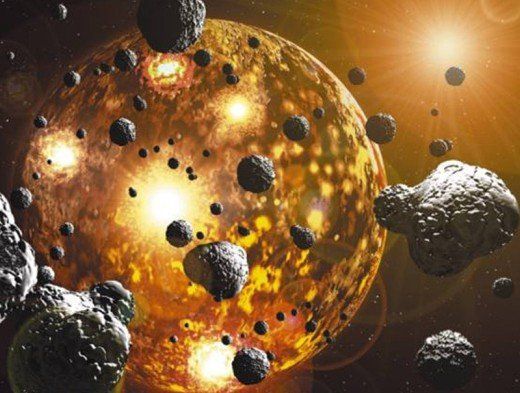The first Anderson or Witzke learned of this setback to their careers was when they arrived at a conference in South Dakota and found people coming up to them with sympathetic looks and saying: "We hear you lost your crater." It was the first they knew that Izett and the other USGS scientists had just announced refined figures revealing that Manson couldn't after all have been the extinction crater.
这对他们的事业是个挫折。安德森和威策克最初听到这个消息是在他们出席南达科他州的一次会议的时候。他们发现人们以同情的目光朝他们走来,说:“我们听说你们丢了那个大坑。”艾泽特和美国地质勘测局的其他科学家刚刚宣布了经过修改的数字,表明曼森大坑原来不是造成恐龙灭绝的原因。这对安德森和威策克来说还是新闻。
It was pretty stunning, recalls Anderson. "I mean, we had this thing that was really important and then suddenly we didn't have it anymore. But even worse was the realization that the people we thought we'd been collaborating with hadn't bothered to share with us their new findings."
“这真令人吃惊,”安德森回忆说,“我的意思是,我们本来有一件着实重要的东西,然后突然之间又失去了。但是,更加糟糕的是,我们意识到,那些我们以为在跟我们合作的人懒得与我们分享他们新的成果。”

Why not?
“为什么?”
He shrugged. "Who knows? Anyway, it was a pretty good insight into how unattractive science can get when you're playing at a certain level."
他耸了耸肩:“谁知道呢?反正我们深刻体会到,科学原来可以这么肮脏,要是你在某个层面上玩弄的话。”
The search moved elsewhere. By chance in 1990 one of the searchers, Alan Hildebrand of the University of Arizona, met a reporter from the Houston Chronicle who happened to know about a large, unexplained ring formation, 120 miles wide and 30 miles deep, under Mexico's Yucatan Peninsula at Chicxulub, near the city of Progreso, about 600 miles due south of New Orleans. The formation had been found by Pemex, the Mexican oil company, in 1952—the year, coincidentally, that Gene Shoemaker first visited Meteor Crater in Arizona—but the company's geologists had concluded that it was volcanic, in line with the thinking of the day.
考察工作转向别处。1990年,亚利桑那大学一位名叫艾伦·希尔德布兰德的考察员碰巧遇见一名《休斯敦记事报》的记者。该记者恰好知道有一个原因不明的巨大的圆形结构。它位于新奥尔良正南大约950公里的地方,离墨西哥普罗格雷索市不远,在尤卡坦半岛的奇克休留布底下,宽达193公里,深有48公里。这个结构是由墨西哥石油公司于1952年发现的──恰好是尤金·苏梅克首次考察亚利桑那州的陨星坑的那一年──但该公司的地质学家认为那是火山形成的,与当时的思想完全一致。













